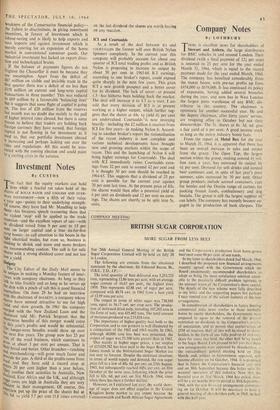Investment Notes
By CUSTOS
Tfirm while a fearful rot takes hold of the tiE fact that the equity markets can hold Shares of ROLLS RAZOR and ENGLISH AND OVER- SEAS INVESTMENT—HOW a fifth of their value a Year ago—points to their underlying strength. Of 'course, they have had Mr. Maudling to help thein—his Swansea speech reassuring them that no violent 'stop' will be applied to the trade exansion —and the excellent report of oEc—with its dividend raised from 9 per cent to 13 per cent on larger capital and a free six-for-five ;erin bonus—to call attention to the boom in the aht electrical trades, but even so, business is tending to shrink and more and more brokers are recommending caution. The call is for safe shares with a strong dividend cover and not too IOW a yield. baleety , The City Editor of the Daily Mail seems to 'le unique in making a Monday feature of inter- siews with company chairmen. As long as they talk to him frankly and as long as he serves up 1,11e dish with a pinch of salt this is good financial I'aurnalism. On June 29 he had an interview ‘vIth the chairman of DALGETY. a company whose shares have seemed attractive to' me for high Yield and slow growth. In 1961 the company nilikerged with the New Zealand Loan and the airman told Mr. Patrick Sergeant that the :nort-term benefits of this merger would come this , year's profits and would be substantial. 1,?°. longer-term benefits would show up over e next five years. The group now has 25 per n'ent of the wool business, which continues to OW at about 3 per cent per annum. That is 21eIr bread and butter. Other branches—ranching ',sad merchandising-7-will grow much faster and wProvide the jam. A third of the profits come from h°I and they have sold a record crop at VL'Ices 20 per cent higher than a year before. reaY confine their activities to Australia, New i‘land, East Africa and the UK, and although tit* costs are high in Australia they are very Ieient in their management. Of course, this Itterview put up the price of the shares but at 6S• 6d. to yield 5.7 per cent (1.8 times covered)
on the last dividend the shares are worth buying on any reaction.
ICI and Courtaulds
As a result of the deal between ict and COURTAULDS the former will own British Nylon Spinners completely. In the current year this company will probably account for about one quarter of ICI total trading profits and as British Nylon is proposing to increase its output by about 50 per cent in 1965-66 ICI earnings, according to one broker's report, could expand quite sharply in the next few years. This gives ICI a new growth prospect and a better cover for its dividend. The lack of cover--at present I.3--has hitherto been holding back the market. The deal will increase it to 1.7 as a start. I am told that every division of ICI is at present working at a higher output, which further sug- gests that the shares at 445. to yield 4} per cent are undervalued. Courtaulds is now investing heavily--including the £2 million it receives from ICI for five years—in making Nylon 6. Accord- ing to another broker's report the rationalisation of the rayon industry is now complete and various technical developments have brought new and growing markets within the scope of rayon. This and the launching of Nylon 6 will bring higher earnings for Courtaulds. The deal with ICI immediately raises Courtaulds earn- ings from 32 per cent to around 42 per cent and it is thought 50 per cent should be reached in 1964-65. This suggests that a dividend of 25 per cent is possible for the current year against 20 per cent last time. At the present price of 83s. the shares would then offer a potential yield of 6 per cent on dividends and 12 per cent on earn- ings. The shares are shortly to be split into 5s. units.










































 Previous page
Previous page